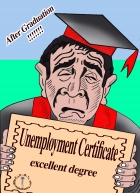For a successful tourism industry, a safe image of the destination is essential. The last thing a tourist will want to be worried about is the safety of their stay while on holiday. Towards this end, the key players involved have to keep their acts together. The owners, the workers as well as the government has to project this image of a clean, happy, inviting and ultimately safe destination for the guests to feel welcome at our resorts.

However recent developments in the country and the continuing attention seeking behaviour of top government officials seems to be doing more harm to our delicate tourism industry than any good. To name just one name, our ambassador at UK Dr. Farahnaz Faisal is reported to have been story-telling to prominent media outlets mostly about little known topics in the Maldives; female genital mutilation, religious extremism, supposed religious scholars exhorting folks to shun vaccination etc. To the average local Ahmed or Mohamed (the equivalent expression for average Joe..?) in Maldives, these are frankly NEWS to them. Its very unlikely the average Ahmed or Mohamed would have heard of these themes either in the media or through word of mouth. The reason is simple! These themes are very unfamiliar and hardly common practice in the country. There are no known scholars or mullahs (or whatever) who exhorted people to avoid vaccination in Maldives. Female Genital Mutilation which has been popularized and sensationalized by media is another red-herring which is totally out of place in Maldives. Most Maldivians would have heard about this practice in media as happening in some parts of Africa akin to killing albinos for supposedly traditional medicinal purposes. There are no known cases of female genital mutilation in the country and no known designs to introduce such practices to the country by any groups or ideology.

This is not to say Maldives is a trouble free country. No country is devoid of problems and problems like everything else has causes and remedies. The most popularized religious problem that happened recently in Maldives is the Himandhoo issue which was caused by the then government’s strong-man tactics rather than Al Gaidha setting up shop in the country. The issue was caused by the government sending military forces to close an unauthorized mosque constructed by the islanders for successive three years in the holy month of Ramazan. The issue could have been easily resolved had the government sent a team of religious men to talk to the people involved and engage them in dialogue. The islanders issue with the mosque was that the mosque was allegedly constructed on top of a cemetery which is forbidden in Islam. The government’s stand at the time was that the government’s position is immovable and has to be respected regardless of the circumstances.
Coming back to the issue and to set the record straight, the most prominent issue that’s currently facing Maldives has nothing to do with religious intolerance or female genital mutilation. The most pressing security problem facing the country is gang warfare and drug abuse which is sweeping through the country and is showing little sign of abating. However in the latest stats presentation offered by the security forces on the independence day, the percentage of ‘reported crime’ rate was said to have fallen 43% which is a definite improvement if all other factors were constant.

The most pressing economic problem is unemployment which to a large extent was an artificial situation created by an unimaginative education system. In a nutshell, a whole generation of youngsters grew up in conformity to 3 streams of subjects (Arts, Commerce and Science) and much too little in the way of vocational education. The non-too-distant ‘maha-singa’ (funny when names are invented) on educational policy was a good start on identifying these problems and the coming years will hopefully see changes to educational system where these issues could be addressed.
The most pressing health problem that is facing the country is lack of facilities and standards. The problem has already been a challenge with the geography of the country whereby small distant islands are further more isolated by lack of a reliable public transportation system. Seeing at a distance, the top positions of the health ministry and the members of lower the rank in the industry seems to be engaged in a proper warfare throughout the industry on a wide range of issues. The outcomes are mixed with more improvements in facilities and infrastructure promised in the near future (as is always the case).
The most pressing social problem that’s facing the country could be the lack of facilities for island communities to get together and do anything ‘social’ to while away the time and participate in social projects. Apart from the Eid festivals the average island’s social calendar is uneventful throughout the year and has been so for ages. With the anti-social behaviour and anti social elements on the increase, this maybe the opportune time to consider such an initiative.
There are indeed many more pressing problems facing the country in many walks of life, but from the perspective of tourism industry nothing can be more damaging than our own political elite spewing out unsubstantiated negative information on the country coveting media attention and personal publicity.



